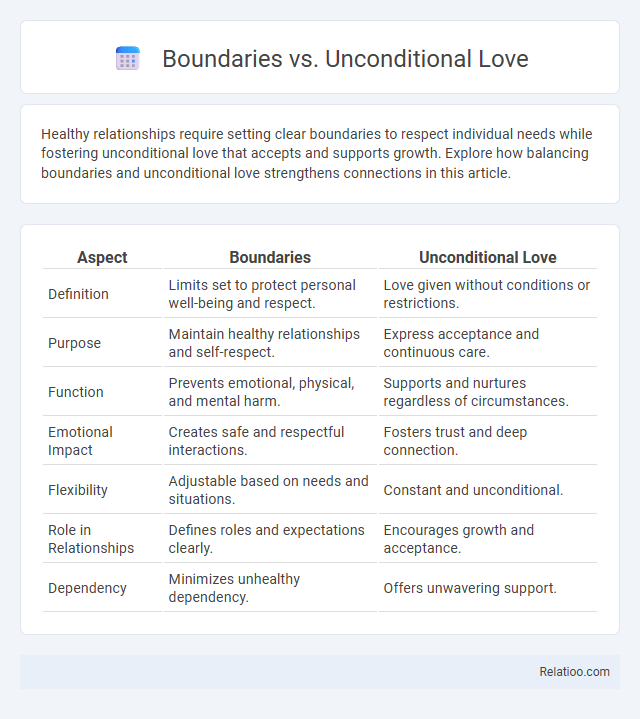Healthy relationships require setting clear boundaries to respect individual needs while fostering unconditional love that accepts and supports growth. Explore how balancing boundaries and unconditional love strengthens connections in this article.
Table of Comparison
| Aspect | Boundaries | Unconditional Love |
|---|---|---|
| Definition | Limits set to protect personal well-being and respect. | Love given without conditions or restrictions. |
| Purpose | Maintain healthy relationships and self-respect. | Express acceptance and continuous care. |
| Function | Prevents emotional, physical, and mental harm. | Supports and nurtures regardless of circumstances. |
| Emotional Impact | Creates safe and respectful interactions. | Fosters trust and deep connection. |
| Flexibility | Adjustable based on needs and situations. | Constant and unconditional. |
| Role in Relationships | Defines roles and expectations clearly. | Encourages growth and acceptance. |
| Dependency | Minimizes unhealthy dependency. | Offers unwavering support. |
Understanding the Concepts: Boundaries and Unconditional Love
Setting clear boundaries involves recognizing and respecting personal limits to maintain mental and emotional well-being, while unconditional love emphasizes consistent support and acceptance regardless of circumstances. Understanding boundaries helps individuals protect their needs and values, preventing emotional burnout, whereas unconditional love fosters a secure environment where vulnerability and growth can thrive. Balancing these concepts ensures healthy relationships grounded in respect and genuine care without compromising personal integrity.
The Importance of Healthy Boundaries in Relationships
Healthy boundaries in relationships establish clear limits that protect personal well-being while fostering mutual respect and trust. Unconditional love thrives when individuals maintain these boundaries, ensuring emotional support without enabling harmful behaviors or dependency. Balancing unconditionality with boundaries prevents codependency and encourages growth, creating a sustainable and loving connection.
What Does Unconditional Love Really Mean?
Unconditional love means offering affection and acceptance without requiring anything in return or setting limits on the other person's worthiness. Boundaries define healthy limits to protect emotional well-being, ensuring respect and mutual care, while unconditionality implies love persists despite any circumstances or behaviors. True unconditional love supports growth within boundaries, blending acceptance with self-respect and accountability.
Common Misconceptions About Boundaries and Love
Common misconceptions about boundaries and love often confuse strict limits with a lack of unconditional love or unconditionality. Setting clear boundaries supports healthy relationships by fostering respect and personal growth, rather than implying rejection or conditional affection. Understanding that your boundaries coexist with unconditional love helps maintain emotional integrity without sacrificing compassion or care.
Signs You Need to Set Clearer Boundaries
Recognizing when you feel consistently drained, disrespected, or overwhelmed indicates that you need to set clearer boundaries to protect your emotional well-being. Unconditional love requires respect and balance, not self-neglect, so understanding the difference between healthy limits and unconditionality is crucial for your mental health. Signs such as frequent resentment, difficulty saying no, and blurred personal limits signal that establishing firm boundaries is essential for maintaining a nurturing relationship.
Can Boundaries Coexist With Unconditional Love?
Boundaries provide essential guidelines that protect your emotional well-being while fostering respect and trust in relationships, demonstrating that unconditional love does not mean accepting harmful behavior. Unconditional love thrives on acceptance and support without conditions, but setting boundaries ensures this love remains healthy and sustainable. You can cultivate unconditionality by maintaining clear limits that honor both your needs and the needs of others, proving that firmness and compassion can coexist harmoniously.
The Role of Self-Respect in Both Boundaries and Love
Self-respect serves as a foundational element in setting healthy boundaries and fostering genuine unconditional love, ensuring Your emotional well-being is prioritized without compromising kindness and care. Boundaries protect Your values and personal space, promoting mutual respect and preventing resentment, while unconditional love embraces empathy and acceptance without demanding change. Balancing self-respect within both concepts allows relationships to thrive with trust, freedom, and authentic connection.
How to Communicate Your Needs Effectively
Communicating your needs effectively involves setting clear boundaries while expressing unconditional love to maintain respect and understanding in relationships. Use assertive language to define your limits without blaming, ensuring your partner feels valued rather than restricted. Balancing unconditionality means embracing acceptance while honestly sharing what you need for emotional well-being and mutual growth.
Overcoming Guilt When Enforcing Boundaries
Setting clear boundaries is essential for maintaining healthy relationships and protecting your emotional well-being without sacrificing unconditional love, which thrives on acceptance rather than control. Overcoming guilt when enforcing boundaries involves recognizing that unconditionality does not mean tolerating harmful behavior but fostering respect and mutual understanding. Your ability to balance boundaries with unconditional love empowers you to nurture connections that honor both your needs and those of others.
Building Lasting Relationships With Respect and Compassion
Establishing clear boundaries fosters trust and mutual respect in your relationships, helping to prevent misunderstandings and emotional harm. Unconditional love emphasizes accepting others without judgment, yet it does not require sacrificing your well-being or tolerating unhealthy behavior. Balancing unconditionality with firm boundaries creates a compassionate environment where lasting connections thrive on both empathy and respect.

Infographic: Boundaries vs Unconditional Love
 relatioo.com
relatioo.com